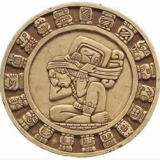Average Enlightenment: Enlightenment As Possibility, Not Fantasy
When I was 24 I saw a “psychic counselor” named Irwyn Greif who was, as far as these sorts of things go, the best I’ve ever had. I told him that, above all, I wanted to be “enlightened.”
He asked me what that meant to me.
I told him about Maurice Bucke’s book Cosmic Consciousness, and about Aldous Huxley’s The Perennial Philosophy, and about various gurus, swamis, and teachers who I had heard about or was greatly attracted to: Da John, Rajneesh, Ramana Maharshi, Insight’s John-Roger, and so on. I told him how I yearned for the sudden flash of illumination that would transform me so that I would lose my fear of death, achieve extraordinarily levels of awareness (and psychic powers to boot!), and become more than human in every way. (What I really needed back then was the love of a good woman, but all things take their time.)
Then I told him about all the various programs and practices I had already undertaken or wanted to undertake. If I could just figure out the right ones to really focus on, I was sure that I would soon be enlightened, and I asked him his advice on which path I should follow. “You want a plan,” he emphatically stated. “I’ll give you a plan. Let go and let God! That’s the only plan.” He continued, “Look, you have a very strange notion of enlightenment. Some of the things that you’ve read about may happen to some of these people, but enlightenment, really, is just being who you are, how you are right now, without any shame, guilt, fear, or second thoughts. Just be who you are. That’s enough. That’s enlightenment.” Some 14 years later, I think back to his words, and I wonder about the vision of enlightenment that I had as a younger man. Back then, I did, no doubt about it, really and truly believe in sudden, permanent transformation and even transfiguration. Now, though, I wonder about just how realistic this view of enlightenment is. One of my teachers once told me that even Buddha and Jesus did not spend all their time in permanently intensely elevated and high states of being. Here are some reasons to think that the claims made as to even the greatest teachers may have been exaggerated:
The human form may not be able to stand such continuously intense energy (some individuals, like Gopi Krishna, have had such intense kundalini breakthroughs that they were forced into bed for months or years at a time … hardly a functional, or desirable, state)
It is quite likely that every great (and not so great) teacher, guru, charismatic, spiritual leader, etc., has had followers who have exaggerated his or her state of consciousness for reasons of projection, myth-making, charisma, and a need to believe in the “perfect master”
Many, if not most, modern-day teachers who have undoubtedly been “enlightened” have had terrible real-world and day-to-day problems and scandals haunt their organizations
A delightfully comprehensive book, The Book of Enlightened Masters (by Andrew Rawlinson, Carus Publishing Company, 1997) helps flesh out some of these points. All of the schisms, all of the fractured organizations, and all of the hundreds and hundreds of people who have a legitimate claim to being considered “enlightened” in some non-trivial respect point to the quality of “enlightenment” as being something that is far different from the pristine, illuminated, eternally enduring quality that I used to yearn for. So, perhaps the focus of this site will begin to turn towards what Bill Eichman, in the Enlightenment Forum, has called “Average Enlightenment.” Eichman writes:
“It seems to me that the question of whether or not one could transmit or receive ‘enlightenment’ over the net is pretty much moot.
If the experiences/phenomena that the word ‘enlightenment’ is commonly attached to exist at all, they represent the tiniest fraction of the spectrum of human ‘spirituality,’ occurring to a small number of people, typically as a result of many years of effort.
Most people who for whatever reasons start up a personal sadhana (spiritual practice) quickly run into hundreds of different types of problems, both with their practice’s results, or lack of them, and with the ego issues that are stirred up by a practice, often troubling or embarrassing ego BS that demands to be dealt with. It’s these types of issues that they are tasked to address, not so often the extra-human issues of enlightened striving for absolute freedom.
Since the problems of the typical spiritual practice are primarily psychological or social or practical in nature, it’s certain that they can be discussed and made clearer over the web as we find it. Chat, video-chat, Real AudioVideo webcasting, and other emerging technologies may make it easier, much easier, for people to have interactive, problem solving ‘conferences’ with either experts or with fellow practitioners who happen to have experience with the topic at hand.
That is, e.com can do what needs doing without invoking the chimera of ‘enlightenment.’ People might want a ‘short road to enlightenment,’ and access to enlightened teachers through the net, but they might benefit more from enlightenment.com if all e.com offered was a well-designed support system to help the average practitioner, the average person, to make the best possible use of what practices and attainments they are blessed enough to enjoy.” I think Eichman has put his finger right on the psycho-spiritual money, as it were, in describing at least part of what this website could become. Not so much a venue to “transmit” enlightenment (as suggested in some of my writings on digital darshan), but instead, a virtual place or electronic community to foster the mutual search for higher consciousness among its ordinary extraordinary members.
By Jordan S. Gruber






